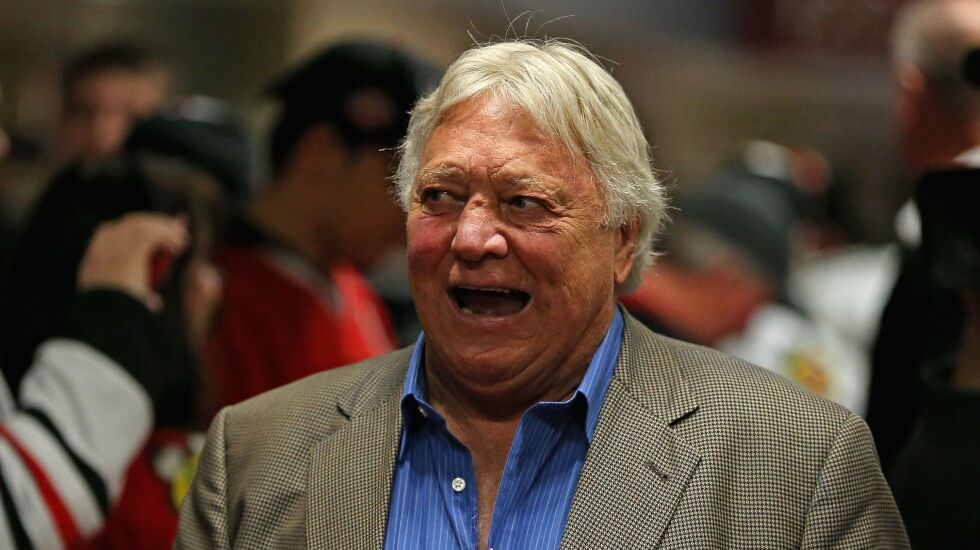
The strongest bonding agent in the world is not epoxy or cement. It’s nostalgia.
Just try separating a man of a certain era from a positive childhood memory. Tell him that the Chevy Corvair was a death trap. He’ll tell you that that’s when cars were cars. Tell him that racism was rampant back in the day. He’ll tell you he didn’t have time to think about such things when he was young because he was too busy playing with friends from morning until dinner time. Parents never worried where their kids were in the ’60s and ’70s!
We’re seeing this phenomenon at work in the raging debate on social media about how former Blackhawks star Bobby Hull should be remembered. Almost immediately upon the announcement of his passing Monday at 84, the battle was on.
On one side are the sentimentalists. Hull was The Golden Jet, a beautiful blend of grace and power. If a circus strongman were to take a hockey stick to a hard rubber disk, Hull’s slapshot is what it would look like. The puck was a blur to spectator and goalie alike. He was a hero to the people who lined up to see him on the Chicago Stadium ice in the 1960s.
On the other side are the realists. Hull was a wife beater, possibly a racist and maybe not the most pleasant guy in the world.
Now, you might think that the stories about a furious Hull beating his second wife bloody with a shoe and then dangling her over a balcony might be enough to turn one’s stomach and alter one’s view of a childhood icon. You’d think that her comments about the incident in a 2002 ESPN documentary — “I thought, ‘This is the end, I’m going’ ” — might convince even the most resistant person that the rampant rumors about Hull over the years were indeed true.
But if you go to Facebook, where many of my contemporaries hang out, you’re likely to see some version of this:
Yes, I know Bobby Hull had his faults, but when I was growing up in (a neighborhood or a suburb), I used to draw his No. 9 on a white T-shirt and pretend I was him. One time I met him in the produce department at Jewel and …
The domestic abuse documented by two of his ex-wives? It’s not part of some fans’ memories of Hull. It’s not necessarily that the incidents didn’t happen. It’s that they occurred in some other time and place, in an alien world. Those incidents don’t fit the old movie playing in their heads. They’re not interested in watching anything else.
It’s not a good look.
Then there were the comments attributed to Hull in a Russian newspaper story in 1998. During an interview, he reportedly expressed dismay that Blacks were reproducing too quickly. The paper also quoted him as saying: “Hitler had some good ideas. He just went a little bit too far.’’ Hull denied saying it. In his sea of issues, this was the easiest one to dismiss. Who would believe something called The Moscow Times? One problem: His daughter told ESPN that, upon hearing the quotes, “The first thing I thought was, ‘That’s exactly like him.’ ”
This didn’t fall on deaf ears in Chicago. It fell on selective ears. Hull’s fans could ignore his ugly side because the other side of him — the side that scored 604 goals for the Blackhawks — was so much bigger and so much more a part of them. When the Hawks hired him to be one of their ambassadors 15 years ago, it was an official signal that all was forgiven, even if his fans didn’t think anything needed forgiving. Imagine a U.S. president naming a known wife-beater to be ambassador to Canada. It boggles the mind.
The Hawks knew their fans all too well.
Many Chicagoans choose to remember Hull for bringing them to the game of hockey. They remember how he made them feel as children and teenagers. They were proud of his working-class origins and proud that he was now theirs. Never underestimate the power of parochialism.
When Hull died Monday, his fans criticized the obituary writers for bringing up his dark side. They thought it was too soon. They thought it lacked respect for the dead. But there’s no pause button for something as serious as domestic abuse. And when the dead person is as famous as Hull was, the entirety of a life is fair game.
I suspect what those fans really thought was that they didn’t want the memory of their hero sullied. He had brightened their formative years, and nothing could extinguish that light. It had prevailed when the whispers about his nastiness had gained steam over time.
Hull’s most ardent admirers sure as hell weren’t going to let his death drudge up a past they didn’t want to remember. No matter how much the truth pressed in on them.







